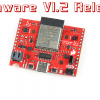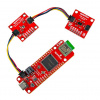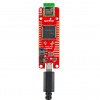If there is one thing that fires me up on a Monday morning, it's talking about inductors and brushed DC motors. In this month's "According to Pete," SparkFun Director of Engineering Pete Dokter takes you to his home workspace to guide you through the basics of these electronic components. Check it out:
You can check out the Vimeo version here. If you have missed any of the previous "According to Pete" videos, or just want to re-watch some of them, check out our YouTube "According to Pete" playlist.
As always, leave any comments, questions, or critiques of Pete's personality and general demeanor in the comments section below. Hope you enjoyed the video and we'll be back next month with another edition of "According to Pete."






There's a lot of things I like on Sparkfun, but According to Pete is by far my favorite. Just far enough above my head that I can watch a video, go and experiment, learn a bit more, come back and watch the video again and get even more out of it. (Rinse and repeat.)
More like rinse and re-pete. Am I right?!
Man, you guys are getting awesome with the editing, lighting and the comic flow of these videos! Good going!
Thanks for the compliment! We have a lot of exciting things coming in the way of videos, including a new engineering segment. Stay tuned!
Anyone else notice the awkward positioning of his right leg?
That's because his left nut is off-set.
Human Resources and our lawyer say I can't comment on this.
Really, there is a wild prosthetic device.
...and I call it Jeff.
lol thats a good one
Looooooool !!
hilarious!
I have been following this project and building an EDM spark machine in parallel. You will be finished ahead of me as I have not been very diligent. Please publish the code for driving the motor!!! I need to have a very stable mechanical slide mechanism with very little overshoot in the downward direction and I am obviously doing something wrong.
Yes please, more induction talk.
Hey Pete .... like your style of not skipping over detail in explaining something. Would luv to hear more in another video talking about the relationship of magnetic fields and current perhaps relating to non-contact movement used in place of servo/motor movement where appropriate.
Learn more:
http://www.youtube.com/watch?v=LXGtE3X2k7Y&feature=g-user-u&context=G21bddd8UCGXQYbcTJ33bFk66rv_L86IF146LuUNvI8TRLzlqnszY
http://www.youtube.com/watch?v=VSMGnmQApA0&feature=g-user-u&context=G2b26b24UCGXQYbcTJ33bFk66rv_L86FFeUsMNHWPWK8EpE_ljnXQ
http://www.youtube.com/watch?v=NgwXkUt3XxQ&feature=g-user-u&context=G23e1f56UCGXQYbcTJ33bFk66rv_L86J_OiB9ytXEJUgsukkApwbI
"As always, leave any comments, questions, or critiques of Pete's personality and general demeanor in the comments section below."
Pete, you smell of Elderberries.
a platapus? PERRY THE PLATAPUS!?
Stupid Comment Follows:
After watching this informative video, I can only assume that the reason an electric motor always turns the same direction when connected to a battery is because of the Right Hand Rule? I knew how they were built, just never figured out what made them turn 1 direction only, every time.
Nah, the Right Hand Rule only tells you the orientation of the magnetic lines of force with regard to the direction of current through the conductor. And I'm not sure which motor it is that you've been using, but these motors will reverse direction if you reverse the power polarity. When you reverse the magnetic fields, motor spins the other way. Not sure if that's helpful or not...
Not dressed so "warmly" today were you Pete?
I liked this a lot and hope you do a lot more on inductance and motors. It might be nice to see a talk about brushless motors, quadrature, and stepper motors. If your sliders had brushless DC motors, would the noise problems have been as great?
Rather than dropping $30 on that DC-DC converter, why don't you use a linear regulator such as the LM317? They're extremely cheap, easy to use, have excellent noise rejection (down to -110dB), and are well known for their use in audio power supplies:
http://waltjung.org/PDFs/Sources_101_P2.pdf
You can even cascode (chain) the regulators for even greater noise rejection.
The DC-DC power supply may be more efficient, but as you're using an amplifier anyway it's probably not going to matter as noise rejection will usually be a priority in audio applications.
Because I want to minimize the amount of current I'm drawing from the 28V supply, and minimize the wasted power. (Remember that I don't have any specs for the supply.) But I certainly have gone the linear route before, but not this time.
And skip the big heatsink :D
Pete, as always, interesting, useful, and more than a little bit humorous. Thanks for doing these videos.
And I would love to hear more about motors- specifically, more 'rules of thumb' or gut-feels about how to drive various kinds of motors, especially larger ones, under microcontroller control. I've always wondered about the differences between the various types of motors too, theoretically and practically.
Quick question to anyone who may be able to help...
What Barometric Pressure Sensor for use in a elevation of ~-50ft to a max of ~750ft, (above sea level) should I use if I want the most resolution?
I don't care if it is smd to much, but if it is smt type part, it need to be either easy to solder.
The scp1000 sensors are accurate and precise enough to measure what you are looking for here. They are accurate to about 1.5 pascals.
The bma085 is also a great sensor, but only sensitive enough to about 3 pascals.
Use the bma085 if you can, they are much easier to work with, and can be hot-air reworked if needed.
Good luck.
How should I contact SparkFun to suggest a series of multimeters that are cheap and on par w/ fluke? (
Why can't I type the full sentence? SFE server wont let me post more than what is above!!!
Use the feedback menu to the right.